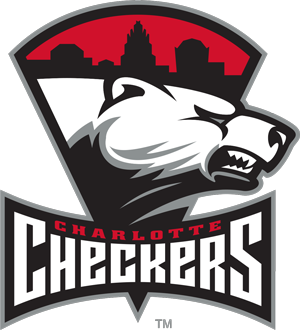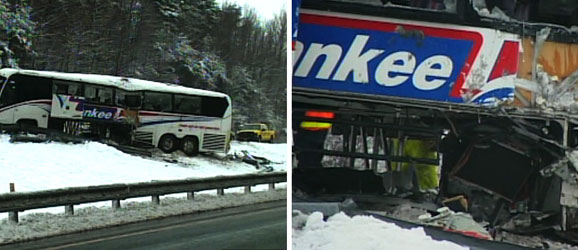Coach Jeff Daniels, Assistant Coach Geordie Kinnear and players Nicolas Blanchard and Mark Flood are still with the Checkers in those same roles today. Radio play-by-play broadcaster Owen Newkirk is now with the Texas Stars.
AN ALREADY LATE NIGHT
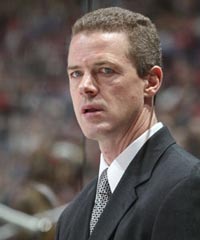
Jeff Daniels in 2006
Blanchard: We had to wait a couple of hours for the other bus to come pick us up. Some guys were sleeping and some guys were playing cards, and I remember Floodie was making the boys laugh.
Flood: It was kind of boring but kind of bonding time too. It was getting hot and stuffy so we popped the roof open and were kind of hanging out of there, joking around and goofing off to kill time like we always do.
Newkirk: By the time the replacement bus came, we should have already been home.
Kinnear: The wait felt like forever. As we were pulling out, the driver just about hit a lamp post in the parking lot and I had to kind of speak up to give him a heads up. That kind of foreshadowed what was about to happen.
Flood: It was on the Mass Turnpike in the Berkshires, so it's snowy and hilly and icy. It was an icy, dark night and there was black ice. It was not a good night for traveling, but it wasn't much different than any other night because we traveled a lot on the bus. You don't think anything of it when you get on the bus. We do it every road trip.
When we got on the next bus everyone was pretty tired. Within a half hour of getting on the road a lot of guys were sleeping. I was sleeping or close to sleeping. I was laying down on my back and I had my feet across on the other seats.
Newkirk: It was so late that everyone was trying to sleep where normally most of the guys would be sitting up or playing cards or something like that. I wasn't a good bus sleeper to begin with, but I was laying down across the seat.
Kinnear: You get to that point after a game, you just want to get home and get in your own bed and know you're in the right place and a safe place. After that game I probably wouldn't have slept on the bus, but with the bus breaking down it was getting pretty late and I was getting pretty tired. I was right behind the bus driver so I was kind of sitting up and leaning against the window, using the glass as a backboard. I don't remember when I went to sleep, but I remember when I woke up.
THE CRASH
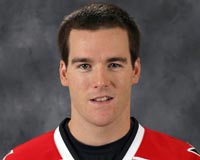
Mark Flood in 2008
Flood: I could feel the bus kind of pulling to one side, almost fishtailing. I woke up and a lot of the other guys started to perk up. I remember skidding and hearing a "boom boom boom."
Blanchard: All of the sudden I heard a weird noise like "bump bump bump" and I opened my eyes right away. I saw Joe Jensen in the air.
Daniels: You started hearing the rumble strips on the side of the road and that kind of woke me up a little bit. I could hear a little panic from the driver and then it happened.
Flood: We flipped over on our side. Scratching, windows breaking. That's when things really got out of control. We knew we were in an accident and guys were being thrown.
Kinnear: I woke up and we must have been spinning or something. I looked across the aisle and I saw Jeff. He kind of had the big bug eyes and we knew something was wrong, though nothing was said. There was no screaming or anything. All I remember is that we were starting to spin, and that's when everything seemed slow-mo.
Daniels: Myself and Geordie had the front-row seat, kind of watching. It was a blur from that point. It was all slow motion, like, "Is this really happening?"
Flood: We slid 100 meters or something like that because we were going pretty fast.
Kinnear: All I remember thinking is that I wanted the bus to stop. Please stop. It was just constant motion. Something was different about the bus, obviously we were on our side, but I didn't know that at the time. Jeff flew into the bus drivers' lap and because I was on that side of the bus I was more on my back. It didn't feel like I was on the ground. I don't remember any friction or anything along those lines. My whole thought process was, "When is this bus going to stop? I want it to stop." I didn't know if we were going to hit something. For some reason there was a calm for me. It felt very focused and very slow, but I just wanted the bus to stop.
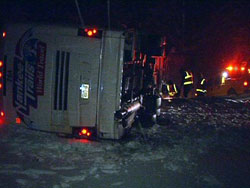
Newkirk: I hit the seat, but my whole left side was in pain. My color guy, John Hennessey, had fallen all the way down and basically tackled our equipment guy, Jason McGrath, through the window, and he had pieces of glass in his back.
Flood: I landed standing up on one leg and kind of straddling one of the seats. I looked down and I was standing on broken glass on snow. I was on the back of the bus, so I must have been standing in the median. I was looking around to see if everybody was OK.
Blanchard: I woke up on the ground. For one second it was silence, then after that all the boys were yelling to see if everyone was OK. I tried to stand up but I couldn't. I knew I couldn't walk but I didn't know what I had. My good buddy Mike Angelidis asked if I was OK and grabbed me because I couldn't walk. Him and Justin Peters helped me to get off the bus through the roof exit.
Flood: Dwight Helminen was cut pretty bad – he landed like I did but didn't have shoes on so his feet were cut and bleeding. Petey might have landed standing up too, and he had his phone out right away calling 911 and he had popped the emergency exit. He was right on things, pretty alert and focused in a chaotic situation.
Kinnear: I'm not sure how it happened, but things started to speed up a little bit for me. I think my survival instincts kicked in. We were on our side so the door was up high and we couldn't get out. Once we got our bearings I saw the bus driver panic a little bit trying to get the door, and then I realized we were in the middle of the road on a 45-degree angle, on a hill. The front of the bus was over the middle of the line.
Newkirk: The whole front end of the bus was still in the passing lane and there were no lights on it. We're in a pretty remote stretch of highway where there wasn't a lot of ambient lighting to begin with and we're in the middle of this blizzard, and you could just feel the vibration of the first few trucks that whizzed past.
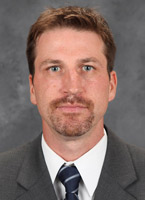
Geordie Kinnear
Flood: At the back, we were probably a little more calm than the guys at the front because they realized where we were. We just knew we were in an accident. We didn't realize where we were or where we were facing until we popped the thing open. We just knew we had to get off the bus, because we didn't know if it would get hit or blow up or something like that.
Kinnear: I ended up grabbing the two railings in the aisle and started kicking the front windshield as hard as I could. Once, didn't budge. Twice, I started to get it, and on the third I finally got the whole windshield to fall out the front. I kept yelling to get out of the bus. I jumped out and I think a bunch of people followed me. Once we got out the front I saw others in the back getting out of the fire escapes, and I looked up the hill and transport trucks were still coming down.
Blanchard: As soon as I got off the bus I saw this big truck flying by us because half of the bus was in the middle of the road. I panicked, and for a guy who couldn't walk, I started sprinting. The adrenaline was crazy.
Kinnear: Clear as day I see one fishtailing down the hill by the bus and he ended up going by, just missing us again. They must have got on the CBA after that and told the other ones to slow down because they all kind of stopped. It was maybe two or three minutes from the initial stop, but I was very concerned that we were going to get t-boned from the side by a transport truck, especially in the front where we were, because we would have had no chance. I honestly thought it was a matter of seconds, but thank God it wasn't, because we would have lost people for sure.
COMING TOGETHER
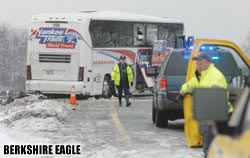
Newkirk: After a while I realized I had my peacoat on as a blanket, but some guys were still in their t-shirts and some guys didn't have shoes because they had been asleep.
Daniels: I had a bit of a headache just from whiplash or whatever it was. Once everyone got out of the bus we kind of converged in the median and grass area in between the two highways just to see where everyone was at and what everyone was doing. Luckily everyone got off the bus.
Flood: We're on the snow bank and it's freezing cold. I was still shaken from the accident but I kind of checked myself over. It was dark so I had one of the guys check to make sure my face was OK because we didn't have a mirror to look at or anything. I was a little bit stiff and had a couple of bumps and bruises, but compared to what happened to some of the other guys, I was fine. We checked each other out as best as we could at the time and assessed each other's injuries.
Newkirk: I saw Casey Borer standing up, but then he starts complaining about a pain in his neck and then I think he was down on his hands and knees. He's trying to rest his head on the ground or on other players because he just didn't have the strength in his neck.
Flood: He was lying face down in the snow bank. I asked him if he was alright and he said yeah, his neck was just really stiff and he thought he had bad whiplash or something like that. In a situation like that you're kind of in shock and you don't even know if you're hurt. You could have a broken leg and your adrenaline is pumping. You just get off the bus.
Kinnear: Casey Borer kept saying that he couldn't move. His head was actually on the ground kind of buried in the snow. We didn't want him to move because something wasn't right. He was not good.
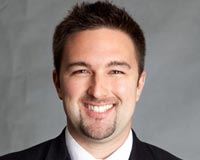
Owen Newkirk
Daniels: Blanch and Casey Borer were in tough shape and I think Owen was a little bit in shock. I tried to make some phone calls to Carolina – Tom Rowe and Jason Karmanos at the time - to let people know right away that we had been in a bus crash.
Flood: Blanch was hurt pretty bad and Jonathan Paiement was hurt pretty bad, and we tried to sort through that as quick as we could and get the guys that needed help off first.
Daniels: I was pretty impressed with the way the team came together at that point. Some guys were bleeding and other guys were helping out and trying to figure out who needed help and who didn't. A lot of credit goes to those players who understood the situation and were going around to make sure that others were OK.
Kinnear: We didn't have a winning season, but that team was really close. You've got to give the players a lot of credit for looking out for each other. Jeff banged his head pretty hard and was hurt a little bit, but they all took care of the guys that were hurt the most in kind of a pecking order. A lot of the guys' character was revealed for sure.
Newkirk: Jeff and Geordie really did an amazing job of going around and talking to everyone, making sure everyone was OK and trying to be as organized as possible. I think Jeff really gained a lot of respect around the league and around the hockey world for how he handled everything.
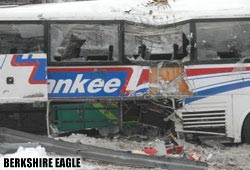
Newkirk: Some guys said it felt like an eternity before the first responders arrived, but by the time I made a few phone calls it seemed like the flashing lights were right there.
Flood: It took a while for the fire trucks and the ambulances to get there, but by the time they did we had kind of figured out who was in need of medical attention first.
Blanchard: I sat on the guardrail on the side of the road and after a while the firefighters and the ambulances arrived and they asked me if I was OK. I told them I felt something leaking on me so the guy lifted my shirt and saw a big wound on my stomach. I didn't see at that time what I had, but they told me I was going to be the first one leaving. I just remember praying to be able to play hockey and really just not to die because I didn't know what I had. After that, I blacked out.
Flood: Four ambulances came and they sent the injured guys away in those, and then a school bus came for the rest of us who were relatively fine.
Kinnear: The bus came and it had that heat cranked and it felt so good.
Flood: They drove us to the Berkshire Medical Center and they put us in rooms of two so we could all be evaluated by the doctor until they could release us. I remember being at the hospital and the doctor coming in and saying that they had to move Casey to see other doctors because he might have fractured his neck. It turns out he had broken his neck, and he had walked off the bus. He shouldn't have probably, but at the time you're on adrenaline and you want to get off the bus as quick as you can.
I was in the room with him when he had to call his parents and tell them. It was pretty emotional. They were obviously pretty upset and he was pretty upset. I'm just glad that I could have been there for him to help him through that.
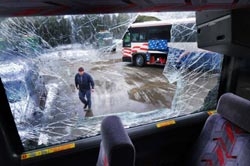
I remember being in the bed in the hospital and telling my family I would be OK and that I could play again. For me at that point it was a lot mental and I was telling myself I'd be OK. Finally the doctor told me I would be able to play hockey again but maybe not this season. At that point it was in my mind that everything would be fine.
Kinnear: The bus ride home the next morning was a little nerve-wracking, but I remember getting home that next morning and was just happy to see the kids and Lorraine.
Daniels: We were fortunate. I remember taking my family to go see Blanch in the hospital a couple of days after and he had his family there at that point, just wanting to touch base. You talked to him when it happened, but a couple of days after it was easier to talk about where you're not as worked up emotionally, just to hear his story about how he went through the guardrail and you're like, "Wow, I never even thought about that." Him telling us that they're picking out pieces of guardrail from his side and he's showing us the cut. My daughter was probably six at that time and it was a little eye-opener for her. He was in good spirits and knew he was going to be fine. It was just good to see that he was there with his family and he was in good hands.
MOVING ON
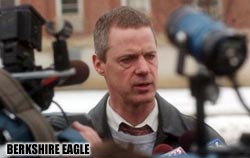
Kinnear: We wanted to make sure everyone was ready to play mentally and got the help if they needed help before we put them in those situations.
Daniels: We told them if you're ready to get back at it, we'll play and I'll go out and find the bodies that we needed to get 20 guys, or if we needed some time to regroup we can do that. As a group we decided to take the weekend off, but we did practice to get the mind off and get back in the flow of things. Most of the guys are young, single and living in apartments by themselves, so we wanted to get on the ice together as a team. That was the team that went through it, and they could kind of relate to one another about what happened and what the situation was. It was good to get on the ice and kind of move on. You weren't going to forget, but even if it was just a practice for an hour, just that distraction. We just had a real fun practice with games and it was real loose, so we were ready to play a couple of days later.
Kinnear: The guys were 100 percent ready to go and wanted to go, and that's when we decided we'd start playing again. To their credit, I don't think they eased into any games. They played the games the way they were supposed to. We got a lot of support from Carolina in getting players in. We moved on right away. That's just how Jeff and I operate - to keep moving forward and don't look back too often and take one game at a time. That was our approach.
Flood: JD and Geordie were great about it. They made everybody take a step back from hockey. I know it's our jobs and stuff, but life is more important than hockey. Everybody being alive and being OK was the main focus. It definitely made us take a step back from that. Finishing the season was different. Guys were just happy to come to the rink and happy to see each other. It gave us a different perspective on life.
Daniels: Our next game was in Bridgeport, and to get from Albany to Bridgeport is probably a two-and-a-half hour drive. The first little while is kind of a country road, and I couldn't, and I'm sure a lot of the guys couldn't, sleep on that first ride. I know I was very jittery, kind of clutching the handle of my seat every time there was a little bump in the road or if you're making swerve on a turn, you're a little gun shy. Those first couple of trips, it was a little nervous. Any bump in the road I'd kind of tense up and all eyes would be on the road. You've driven however many miles on the bus from the time I was playing to coaching and you never thought twice about it.
Newkirk: On our next bus ride there were two routes, one that was all highway and another one that was a shortcut that was this big winding road along a river. We took the winding road, and I think every time we went around one of those curves there was this feeling of, "Hang on!" but I think it was good to do that and get back on that wobbly horse right away.

Newkirk: We were a .500 team at the time, but that was really it for us. We weren't the same after that. The opposing teams would send us fruit baskets and things like that, but no matter what they sent it was the gesture of all being in this together and being a part of that small hockey world.
Blanchard: After the accident I couldn't do anything. They had to wash me, they had to feed me and I couldn't do anything. I kept my wound open for a month almost because they were scared it would get infected. The nurse would come to my house and change my wound. They'd put tissue in it and cover it twice a day. It was the most painful thing ever because the tissue would get stuck in my skin and my blood and they'd have to pull it out. It was tough. Finally a month later they did the surgery to close the wound.
I couldn't work out for the next month because I couldn't even walk. My parents came to Albany for two weeks and cooked me a lot of food and took care of me. The Canes also really took care of me with all the doctors and all the staff and the encouragement.
Flood: Casey stayed in Albany and it worked out good because my girlfriend was kind of his caretaker. I was on the road a lot to finish the season out and she'd help him put his socks on because he was obviously really stiff in the neck brace and limited to what he could do.
Daniels: It was good to have Blanch and Casey around. The last game of the year was at home and we wanted Blanch to take warm-up. We got the OK from the league to have an extra guy taking warm-up because they knew the situation.
Flood: It was a big deal. Everyone gave him a standing ovation.
Blanchard: All the boys on the team were laughing at me because I couldn't handle the puck. I was laughing so hard too.
Daniels: I think it was good for Blanch to not have to wait all summer to get back into it. He got a chance to end his season with some practices and prepare for a game. It was good for him and good for the guys to see that Blanch was going to be back. He's always been a high-character kid and I know he meant a lot to the team.
Blanchard: It was funny, but it was a happy moment seeing that I'm getting better and that I would be able to play hockey again. It gave me a lot of energy for the summer to work out, and in the middle of June I was back in the gym and doing really well. I was able to be ready 100 percent for the next camp in Raleigh.
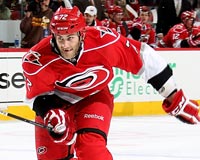
Nicolas Blanchard in the NHL
Daniels: You see that nothing can stop him. He plugged away for many years not getting a chance until he finally got that chance last year. When you tell those guys that they're going up, it's pretty special because you've been with them for so long. Nothing was ever given to him. He's had to earn everything.
Flood: The next year after that I played in Bridgeport, and getting on the bus was tough. I had trouble sleeping on the bus after that for a while. When we'd hit the rumble strips or something I'd perk up, and when it was bad or snowy weather it was tough. I was nervous, for sure.
Newkirk: There are still moments where the brakes hit quickly where it comes back to you a little bit.
Blanchard: For the next year after that, every time I lay down on the bench and the driver hit the brakes, I'd wake up right away and look out front. Obviously it's on your mind, but I'm OK today. Mentally it's been really good.
Kinnear: The only trigger I have is that loud engine. As soon as I hear someone downshift a transport truck. I don't think about the bus crash that much because I'm the type of person that moves on when things happen in your life. That's one trigger I definitely have – when I hear someone downshift a tractor trailer. It's like a song where you're dancing with your high-school sweetheart. I get a different kind of feeling when I hear that transport truck and it brings back those memories. Those 30 seconds where it could have been ugly. I don't get nervous or scared – it's just a reality check.
Blanchard: You're looking back and feeling lucky because the guardrail didn't hit me anywhere else. You're going 60 miles an hour and all of the sudden a guardrail hits you. It could have taken part of my body with it.
Kinnear: Someone was looking out for me and everyone else because we didn't lose anybody. If they had turned four feet one way we would have lost a lot of people, but it wasn't meant to happen.
Blanchard: As a team we were really lucky that no one died. It changed the perception of life for me. I consider myself a lucky man to be healthy today and do what I love to do as work and just be around the people that I love. I'm not afraid to say that I appreciate a person or that I love a person anymore. I'll let them know that they're important for me in life. For me it was a wake-up call. Life can be really short and you've got to appreciate life every day because you never know what's going to happen. Do whatever you want in life but be happy, because life is short.


